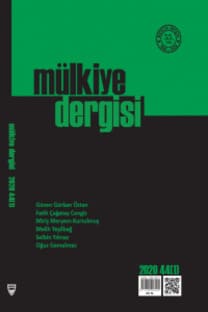Kapitalist Sermeye Birikimi ve Kapitalist Kent
Özellikle 1980 sonrasında kapitalist sistemin yeniden yapılanmasına denk düşen neoliberal küreselleşme süreci sadece üretim tarzının değil aynı zamanda devletin de yeniden inşa edildiği bir dönüşümü kapsamaktadır. Sermayenin sınır tanımaz akışkanlığıyla karakterize edilen neoliberal küreselleşme süreci, küresel ölçekte hızla ‘her şeyin’ metalaştırıldığı ve sermayenin mantığına teslim edildiği bir tarihsel sürece tekabül etmektedir. Bu süreçten kentler de nasibini almış, neoliberal ideoloji kentleri sadece kapitalist birikimin mekânları olarak değil, araçları olarak da görmüş ve bu doğrultuda yeniden yapılandırılmasına girişmiştir. Bu yeniden yapılandırmada kentler piyasa mantığına teslim edilmiş ve çeşitli aktörlerinin kullanımına açılmıştır. Bu çerçevede kentler, özellikle iddialı ‘finans merkezleri’ olarak küresel sistemle entegre olan büyük metropol kentler, yoksulluğun başlıca taşıyıcıları ve bu bağlamda kentsel gerilimlerin de mekânı olmaktadır. Söz konusu sürecin kentsel mekâna yansıması ise, mekânsal ayrışma ve mekânsal dışlanma olarak karşımıza çıkmaktadır. Karşılıklı birbirini besleyen kentsel yoksulluk ve mekânsal ayrışma sürecinin ivme kazandırdığı suç olgusunun yarattığı artan güvenlik endişesinin kentsel pratiklere yansıması ise, korunaklı yaşam alanlarının, yüksek güvenlikli sitelerin inşasının hızla çoğalması ve ortak kamusal mekânların giderek azalmasıdır. Bu çalışmada kentlerin neoliberal küreselleşme sürecindeki değişim ve dönüşümleri sermaye birikim mantığı ekseninde ele alınacaktır.---Neoliberal globalization process which coincides with post-1980 restructuring of capitalist system includes a transformation not only of mode of production but also reconstruction of state. Characterized within the boundless capital, the process of Neoliberal globalization corresponds to a historical period in which ‘everything’ is rapidly commoditised and surrendered to the logic of capital in a global scale. Cities also had their shares in the process; neoliberal ideology did not see the cities as the spaces but also the tools of capitalist accumulation and started re-structuring in this direction. In this restructuring, cities were given to market logic and opened for the use of various actors. The name of this new restructuring is urban transformation practices. These urban transformation practices, outlines of which were drawn by rent seeking capital and resource necessity of the state, have mostly ignored humane dimension. Replacement of social state with neoliberal state which is especially characterized with the decline in social responsibilities of the state, decline in social security expenditures and social rights and increase in employment problems and, in this context, growing informal sector with increasing unemployment and deepening income inequality have accelerated poverty phenomenon in becoming a global problem. In this frame, cities, especially those great metropolitan cities integrated into global system as assertive ‘finance centres’, have become the main carriers of the mentioned poverty and, in this context, spaces of urban tension. The reflection of the mentioned process in the urban space is seen as spatial disintegration and spatial exclusion. . Reflections of increasing security concerns, caused by the crime phenomenon which has been accelerated within the process of mutually supporting spatial disintegration and urban poverty, on urban practices are, then, rapid increase in the construction of protected living spaces and high-security sites and rapid decline in shared public spaces. In this article, the change and transformation of cities in the process of neoliberal globalization will be analyzed in terms of the rationale of capital accumulation.
Anahtar Kelimeler:
Kapitalist üretim tarzı, sermeye birikim rejimi, kapitalist kent, neoliberalizm mekânsal dışlama. Mode of capitalist production, capital accumulation regime, neoliberalism, capitalist urban spatial exclusion.
- ISSN: 1305-9971
- Yayın Aralığı: Yılda 4 Sayı
- Başlangıç: 1965
- Yayıncı: Mülkiyeliler Birliği Genel Merkezi
Sayıdaki Diğer Makaleler
Yaratıcılık ve Humor: Türkiye’de Protestan Zamanlar
Yeni Türkiye'de Eski Mihraklar
Kapitalist Sermeye Birikimi ve Kapitalist Kent
Özgürlük İçin İsyan-Direniş Hareketinin İçeriği Üzerine
Anayasa Mahkemesi ve 4+4+4: Din ve Vicdan Özgürlüğü Hanesinde Elde Var 0
Türkiye'de mesleki ve teknik ortaöğretimin eleştirel bir analizi
Joan Wallach Scott’un Örtünmenin Siyaseti
